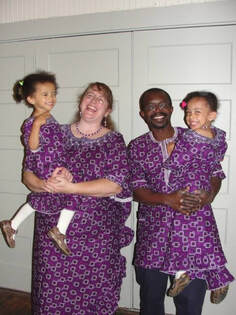|
11/2/2020 The Kabba Woman from Massachusetts Click to listen to the Podcast Click to listen to the Podcast “I have become all things to all people... I do it all for the sake of the gospel, so that I may share in its blessings.” Paul, 1 Corinthians 9:22-23 I was 40 when I married Joseph Olajide Elewononi. As a girl I always assumed I would take the name of my spouse, and would doodle various combinations of my name and the ones who attracted my desire in my notebook. But by 40 I had lived with my original name for a long time and didn’t want to simply exchange Mount for Elewononi. Under other circumstances I might not have changed my name at all. Marrying an immigrant after 9/11 added a new consideration. One strategy for showing that I really meant this union was by changing my name. My Doctor Mother had simply added her spouses’ last name to hers, so I went ahead and did likewise, filling out all manner of forms to let people know I am now Sarah Jean Mount Elewononi. When our first child was on the way I asked my husband if he would like to give her an Owé first or middle name. He said Elewononi was enough for her to deal with in American culture. It takes patience and some humor to help others know how to spell and say our name. My favorite advice is to say Elewononi rhymes with elbow macaroni. After Grace was born Joe’s cousin Kola came to visit. We enjoyed showing him the sights of Boston and we were glad for his rich booming voice and hearty laugh interwoven with our conversations. One evening at supper Kola looked at me and declared me to be the “Kabba woman from Massachusetts.” Joe and Kola grew up in Kabba. As Joe was heading to Syracuse, New York, his father took him aside and said he was only to marry someone from Kabba. And sure enough, most of Joe’s siblings are married to other people from Kabba. But Joe’s adventures in America did not lead to encounters with many Africans at all, let alone Yoruba or people from Kabba. When Kola called me “Kabba woman from Massachusetts”, years after Joe’s father had died, I felt delighted and appreciative. I take it to mean that Kola sees in me some essential aspects of character that meet the family needs for connection, harmony and well-being. I belong. When has someone let you know you belong? When have you broken the rules for fitting in? How did that effect your relationships with yourself and others? What aspects of your identity transcend tribe, language or nation?
Josephine Olufunmilayo Alexander (Nee Dukiya)
11/3/2020 12:49:59 am
Okun o Iye Owe, iyawo Josefu. Lovely story. Owe agbe wo!
Rebecca Cho
11/4/2020 12:46:52 pm
Hello, my friend! Thank you for your article. I feel like I have some understanding of what it might have felt like for you to be called a "Kabba woman." Shortly after getting married, I went to South Korea with my husband and spent the summer there. This was a chance for me to spend more time with his family and learn more about the culture. Sometimes people would say that I seemed Korean to them. I could barely speak any Korean, so it certainly wasn't because of my language skills. To me, it seemed like it meant that I was observing people well and paying attention to social cues. It was a good feeling to be made to feel that I belonged even though I felt out of place in many ways. Comments are closed.
|
AuthorSarah Mount Elewononi is an ordained Elder in the United Methodist Church. A member of the New England Annual Conference for over 20 years, Sarah now resides with her family in greater Pittsburgh. Sarah completed the requirements for her doctorate from Boston University on Christmas Eve 2014. She worked with Dr. Karen Westerfield Tucker and Dr. Nancy Ammerman to better understand worship and change - both how repeated acts of worship change us, and how and why worship changes whether we want it too or not, and why we can be resistant to that change. Her dissertation was focused on Methodist worship at New England camp meetings in the 19th Century. Sarah is a member of the North American Academy of Liturgy, the Order of St. Luke and the Girl Scouts. Currently she leads her daughters' Girl Scout troop and serves as a substitute teacher. She also teaches a variety of United Methodist Course of Study offerings in worship, theology and Biblical studies. Archives
October 2021
Categories |
 RSS Feed
RSS Feed
